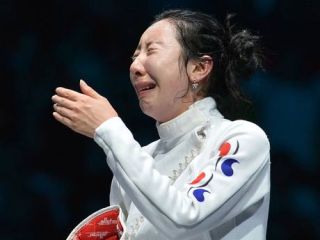Sport and Competition
Crying: An Olympic Event?
London 2012: "The Crying Games"
Posted August 9, 2012
In London this summer, the tears are falling like raindrops.
With so much sobbing going on, the press has dubbed the 2012 Olympics as the “Crying Games”. Whether it’s in the pool, on the podium, at the finish line, or even on the Today show, what’s all the crying about?
Felix Sanchex celebrates an emotional victory

Felix Sanchex celebrates an emotional victory
Who’s crying most?
Studying the reactions of nearly 130 gold medalists during their award ceremonies at the London Games, reporters Jared Diamond and Chris Herring sought to answer this question in a report for the Wall Street Journal. Even though we tend to think the games are awash in tears, only 16% of the winners cried on the podium (the same percentage either bit or kissed their medals). Cultural stereotypes prevailed: women cried three times more than men (25% to 8%) and Chinese athletes cried the least (only 7%). And forget about the “stiff upper lip”, winning in front of the home crowd has had by far the most overwhelming emotional effect: nearly 40% of British athletes could have used Kleenex given to them along with their gold medals.
Why all the crying?
For the most part, we still don’t know. What makes us weep and even what happens in our bodies when we do is largely a scientific mystery. Crying is a complex behavior and there are many facets behind why our brains turn on and off the water faucets.
Some theorists believe that crying serves as a distress signal, amping our bodies for action and alerting the people around us that trouble is afoot. At the Olympics, this theory might make sense in some circumstances, like when Chinese hurdler Liu Xiang, a gold medalist in Athens, crashed into the first hurdle in a preliminary heat and had to withdraw due to injury just like he did in his home country four years ago. Other times, like after Missy Franklin’s record-smashing backstroke victory, the “tears as distress call” theory doesn’t hold up so well.
Instead of just sounding the alarm, crying can also be our body’s way of restoring physiological balance after psychologically stressful events. Dutch researchers at Tilburg University found that while the act of crying may initially increase heart-rate and bodily arousal, but it also results in slowed respiration and physiological relaxation. “Physiologically speaking,” write psychologists Jay Efran and Mitchell Greene for Psychotherapy Networker magazine, “emotional tears are elicited when a person’s system shifts rapidly from sympathetic to parasympathetic activity—from a state of high tension to a period of recalibration and recovery.” Shedding some tears might just be the body’s natural way of coming down from the physical highs of an Olympic-level athletic performance. Getting choked up in Olympic victory is way better than dealing with choking under athletic pressure.
For crying out loud, enough already?
All the blubbering and hanky-waving is enough to make some viewers want to throw in the towel [my guess is that, for one, McKayla Maroney is not impressed]. Others, however, welcome the flood of emotion as part of what the Olympic Games are all about.
Korean fencer Shin A Lam laments a timing error

Korean fencer Shin A Lam laments a timing error
Emotional displays humanize athletes who seem otherwise capable of superhuman feats. Most of us will never know what it feels like to run a mile in record time or to stick the landing in front of a packed arena, but we can connect to what it feels like to work hard and achieve our goals with the support of family and friends or even to try so hard to reach a peak performance only to fall just short of expectations. And when athletes break down in tears thinking about all they’ve sacrificed, who has helped them get where they are, and who they’ve lost along the way [like Dominican American Felix Sanchez, who’s emotional victory in the 400m hurdles was in memory of his late grandmother who died during the 2008 Beijing Games], it’s hard to keep a dry eye.
But there’s some crying that’s tough for most people to get behind: anger and frustration. It could be bawling over a bad call [like the lamenting Korean fencer Shin A Lam who had to be escorted away after a timing error left her inconsolable and unmoving from the fencing strip] or crying foul [like LoLo Jones expressing grievance at unfair shake from the media], but while angry cries might drum up some sympathy, they leave most viewers feeling an athlete is out of control, overreacting, or ungrateful.
In the end, whether it’s the bittersweet thrill that comes with victory or the sobering sob of disappointment at the hands of a close defeat, we watch sports for the stories they tell and the emotions they evoke. After the final medal is handed out, the last anthem is played, and the Olympic cauldron is extinguished, the 2012 London Olympic “Crying Games” will be an event to remember, either in spite of all the weeping, wailing, blubbering, and bawling, or perhaps, because of it.
--
By Jared DeFife, Ph.D.


